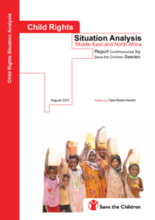Executive Summary
Countries in the Middle East and North Africa (MENA) region are displaying a growing awareness of the importance of protecting and promoting child rights. All the states in the region have ratified the United Nations Convention on the Rights of the Child (Convention), and with the exception of the United Arab Emirates (UAE), all the states covered in this report have ratified the two Optional Protocols to the Convention on the Sale of Children, Child Prostitution and Child Pornography (OPSC) and on the Involvement of Children in Armed Conflicts (OPAC). The MENA countries are implementing legislative, policy, and institutional measures to promote the rights of children, as enshrined in the Convention, international human rights conventions, and regional instruments such as the League of Arab States’ Arab Charter on Human Rights and the African Union’s African Charter on the Rights and Welfare of the Child.
Significant gaps however persist and countless children suffer from rights violation, in the fields of protection, education, survival and development, and health. Long-term political instability and violence in the occupied Palestinian territory (oPt), Iraq, and Yemen continue to adversely impact upon the rights of children, while recent political developments, as manifested by the Arab Spring of 2011, have heighted protection risks for children, particularly in Syria, Libya, and Bahrain. The protests that have swept through the MENA region since early 2011 have brought violations of rights, including child rights, to the forefront of international attention.
In the field of right to protection, considerable advances have been made on the legislative front to protect children from violence, abuse, neglect, and exploitation, in line with recommendations made by the United Nations (UN) Committee on the Rights of the Child (Committee). Regional bodies, namely the Organisation of the Islamic Conference (OIC), the League of Arab States, and the African Union (AU) have also been taking positive measures to promote the implementation of the recommendations of the UN Study on Violence against Children (UNVAC), and have committed to place the issue of violence against children as a permanent item on the agenda of their summits.

